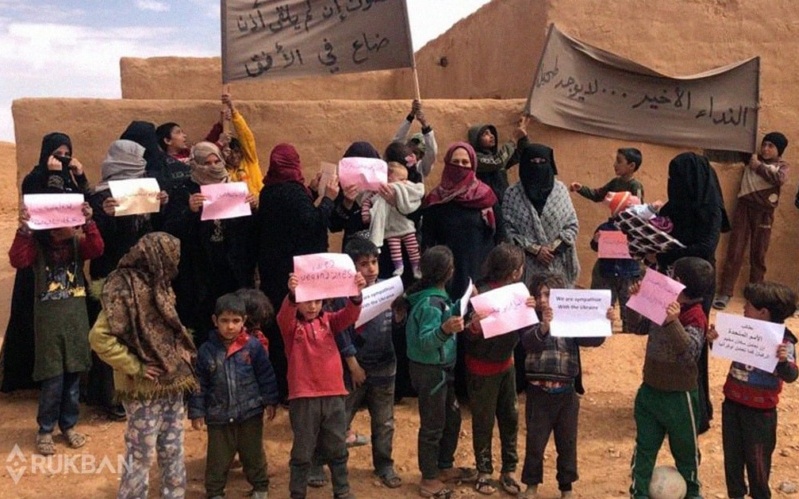Women and children protest conditions in Rukban camp in southeast Syria on the Jordanian border, March 23, 2022 (Rukban Network)
The 12,000 displaced Syrians in the barren Rukban camp, near the Jordanian border, face the renewed threat of starvation.
Residents of the camp have been short of food for much of the 6 1/2 years in Rukban, after fleeing Islamic State attacks in central Syria in 2015.
Russia and the Assad regime imposed a siege in autumn 2018, cutting off the main route into the camp and allowing only three UN aid convoys in more than three years, the last in September 2019. The prospect of starvation — as well as lack of health care and medicines, poor water, and inadequate shelter — forced most of the 75,000 in the camp to accept transfer back to Homs Province, despite the prospect of interrogation, detention, and even disappearance.
However, the remaining 12,000 have held out, appealing both for a lifting of the siege and for US forces, at the Tanf base in eastern Syria, to intervene.
Humanitarian activists have arranged limited aid and even a breakthrough with medical care at the Tanf base and inside Rukban.
But in February, the Assad regime’s forces cut off the remaining smuggling routes. On March 17, Rukban’s only bakery stopped production. They tried to make bread from bran fodder for animals, but this was rejected by residents.
The besieged civilians are using milk, rice, bulgur, and other items, but supplies are near exhaustion, residents warn.
One resident, “Hamoud”, said to The New Arab, “Some families not eating one loaf of bread for five days.” Some are creating dry, almost inedible, bread out of wheat husks.
One smuggler was able to bypass the checkpoints and enter the camp with 19 sacks of flour. The supply provided bread for only two days.
Al-Rukban Network: The price of a kilogram of tomatoes reached 4,500 Syrian pounds, potatoes at the same price, while the price of eggplant and zucchini reached 5,000 Syrian pounds. The bread oven stopped again after the flour that reached the Rukban camp ran out two days ago. pic.twitter.com/r6Sxh563so
— Rukban Network (@rukbannetwork) March 28, 2022
Blame on Assad Regime and on US-Led Coalition
Media activist Imad Ghaly, who lives in the camp, tells Syria Direct, “The Assad regime [is] responsible for starving the people of Rukban.” However, he notes the tactic “is not strange for the regime, as it used the starvation policy against its opponents in several Syrian regions”.
So the activist also blames “the failure of international coalition forces to respond to protesters’ demands a month and a half ago, which were directed at them, and not providing any aid to the people”.
The international community’s silence towards the violations against us amounts to support for the regime. Shame on the international community and international humanitarian organizations if they do not act to save the camp.”

